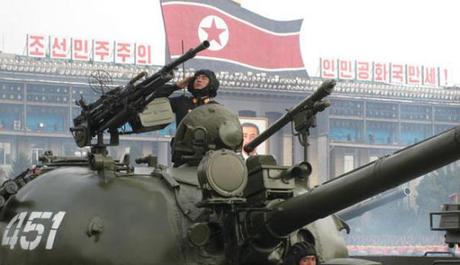
It seems as if our earlier article outlining all the reasons we won’t travel to North Korea has caught the attention of a firm specializing in such tours. Over the past couple of days a representative of Krahun Co. has been quite active in the comments section of our original post.
In that article we made the following argument (among others) against travel to North Korea:
Unlike more open economies North Korean leaders can’t simply convert their domestic money (the Won) into other world currencies or borrow those currencies on world markets. Nobody outside of North Korea will accept Won as payment for anything. If the government wants to buy foreign goods, it must first obtain enough foreign currency (typically dollars, Euros, or Renminbi) to make the purchases.
And the DPRK really wants to buy foreign goods. One way the government keeps its generals happy is by plying them with French wine and Russian caviar. Bestowing foreign luxuries is a critical tool the ruling elite uses to retain power. But getting enough “hard currency” to pay for such extravagances is difficult for the regime.
Tourism is one avenue for bringing hard currency into the country”
We wanted to ask Krahun about this concern because we’ve seen other travel bloggers claim to have gotten comfortable with how their tour money is spent after discussing it with a tour operator. What follows is the transcript of our conversation with Krahun (edited only for length. The completely unedited version can be found in our comments section starting here.)
See if his answers make you comfortable paying for a tour to North Korea.
Krahun: The tourism money that comes in to our region (There are cities other than Pyongyang in a country of nearly 25 million) gets divided between the hotels, restaurants, transportation company providing the vehicles, tour company with their overheads, etc. Yes, the government directly takes the visa processing fee and receives tax (or quota as it is called here for state-run entities). We are supposed to pay 14% in tax, but we have thus far paid 0% because the government considers us to be a beneficial presence to their people. . . .
The visa fee and the tax are the “big bad gov’t portion”. Even then it’s further divided. As you can see, nothing of value is gotten for free in DPRK, just as in the US, or anywhere else in the world. If you have questions about the tax types, rates, etc., our accountant in DPRK (American, born and raised) can bore you with details. After all, wasn’t all this talk started because of the concern over where the money was going?
EverywhereOnce: You mention, for example, that some tour money goes to restaurants inside the DPRK. Perhaps you could walk through who owns those restaurants, how the staff is paid, in what currency, and what exactly happens to the Euros I give you.
K: Of course we know such details. We have a place here ourselves, not to mention being friends with many other operators. But I doubt that there’s anything that I could say that will make you believe the truth. Gotta go. It’s almost midnight here.
EO: Your evasion of the direct question about exactly where Euros spent on one of your tours go is the most straightforward and revealing of your now dozen comments. So thanks for that.
Of course we both know “the truth” of the matter. But let’s fill in the blanks for our readers, shall we?
The restaurants and hotels and everywhere else you visit inside DPRK are owned by the North Korean government. The workers at these places are compensated (to the extent they’re compensated at all) in North Korean Won or perhaps just government rations. Your tour company pays foreign currency to the government for these restaurant and hotel services (either directly, or via a tax, or as dividends through a joint venture structure – the exact mechanism isn’t really important.)
The only question remaining is how much of each tour price ends up in the government’s hands? Here’s my swag:
The money I pay you for a tour goes to three places. 1) Salary and reinvestment in the Special Economic Zone 2) Return to your foreign investors 3) The North Korean Government as described above. So how might my tour price be allocated among these three different categories?
Let’s start with the first two. Running a tour company requires very little physical investment. In fact, I could start running tours tomorrow almost anywhere in the world and my up-front costs might be a couple thousand dollars – probably less. If I needed staff to scale up, wages in Rason are very cheap by U.S. and European standards.
All of that means I don’t need to allocate much from each tour package price to cover overhead. And the low up-front investment means I don’t need to pay much to my foreign investors to provide them with attractive returns (keeping in mind, too, that the North Korean Government is keen to limit the returns foreign investors can earn.)
Meanwhile, the costliest part of any tour is meals, lodging and transportation – almost all of which is provided by the North Korean government from government owned resources. It stands to reason, then, that the lion’s share of each tour price goes to the government in the form of foreign currency to provide those services.
My guess is that the government’s take on each one of your tours is above 70% of the quoted price.
K: Brian, you will find it difficult to accept, but everything (no exaggeration) you’ve just written is wrong. Hence, I don’t want to venture to guess what your understanding of “the truth” is. And I wasn’t evading your question about the Euro (I assumed that you were being specific about the Euro.). I was trying to answer what I thought you may have wanted to know because you couldn’t have meant what you wrote. We’ve consulted for businesses, NGO’s, and even governments in the past 15 year, helping with negotiations, information gathering, working through legal tight spots, or starting projects/businesess. I was giving sincere answers in your blog to questions that I hear often from first time visitors. Perhaps I wasn’t being clear enough or my thoughts sufficiently organized. Either way, I hope my comments helped drive few more hits to your site. Thank you for letting me post comments.
EO: Another revealing evasion. Thanks for showing us firsthand how business is done in DPRK. You’ve done everyone here a great service.

